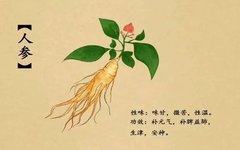Ginseng (Renshen) is a well-known traditional and precious Chinese medicine. The ancients believed it to have a “human-like shape and powers that can match heaven and earth,” hence the name ginseng. It is regarded as a traditional tonic in China, alongside deer antler and donkey-hide gelatin, collectively known as the “Three Treasures of Chinese Medicine.” Ginseng is renowned for its excellent efficacy in treating common deficiency-related diseases, earning it the title of “King of Herbs.”
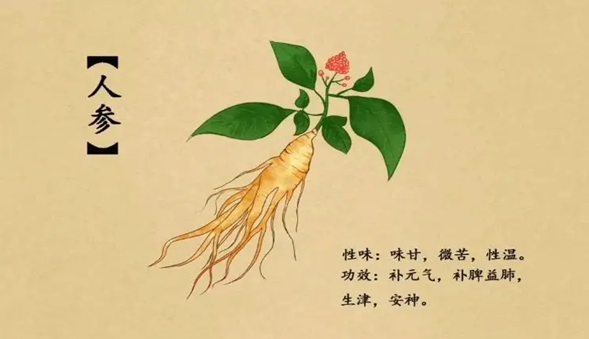
Effects of Ginseng: Greatly tonifies the original qi, moistens the lungs and generates fluids, supports the pulse and stabilizes collapse, generates fluids and calms the spirit.
Types of Processing: Ginseng can be categorized into different types based on processing methods, including Red Ginseng (Hongshen), Fresh Sun-Dried Ginseng (Shengshaishen), and Sugar Ginseng (Tangshen). Below are their preparation methods and effects.
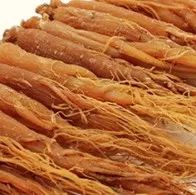 Red Ginseng Preparation Method: Take the raw herb, gently roast it over low heat or moisten it slightly, remove the rootlets, slice thinly, and dry.Effects: It is slightly warm and dry in nature, most suitable for individuals with weak yang qi or yang qi collapse, and is applicable for emergency resuscitation. It excels in greatly tonifying original qi, benefiting qi and nourishing blood, suitable for patients with extreme qi deficiency, weak pulse, and those experiencing heart failure or cardiogenic shock.Fresh Sun-Dried Ginseng Preparation Method: Take the raw material (Garden Ginseng), remove the rootlets, wash thoroughly, moisten, slice thinly, and dry, or crush it.Effects: Its effects are weaker than Red Ginseng, and it is cooler in nature. In addition to tonifying qi, it also has fluid-generating properties, suitable for patients with both qi and yin deficiency. Generally suitable for the elderly, those with weak constitutions, and patients with chronic diseases such as diabetes, tumors, hepatitis, and nephritis.
Red Ginseng Preparation Method: Take the raw herb, gently roast it over low heat or moisten it slightly, remove the rootlets, slice thinly, and dry.Effects: It is slightly warm and dry in nature, most suitable for individuals with weak yang qi or yang qi collapse, and is applicable for emergency resuscitation. It excels in greatly tonifying original qi, benefiting qi and nourishing blood, suitable for patients with extreme qi deficiency, weak pulse, and those experiencing heart failure or cardiogenic shock.Fresh Sun-Dried Ginseng Preparation Method: Take the raw material (Garden Ginseng), remove the rootlets, wash thoroughly, moisten, slice thinly, and dry, or crush it.Effects: Its effects are weaker than Red Ginseng, and it is cooler in nature. In addition to tonifying qi, it also has fluid-generating properties, suitable for patients with both qi and yin deficiency. Generally suitable for the elderly, those with weak constitutions, and patients with chronic diseases such as diabetes, tumors, hepatitis, and nephritis.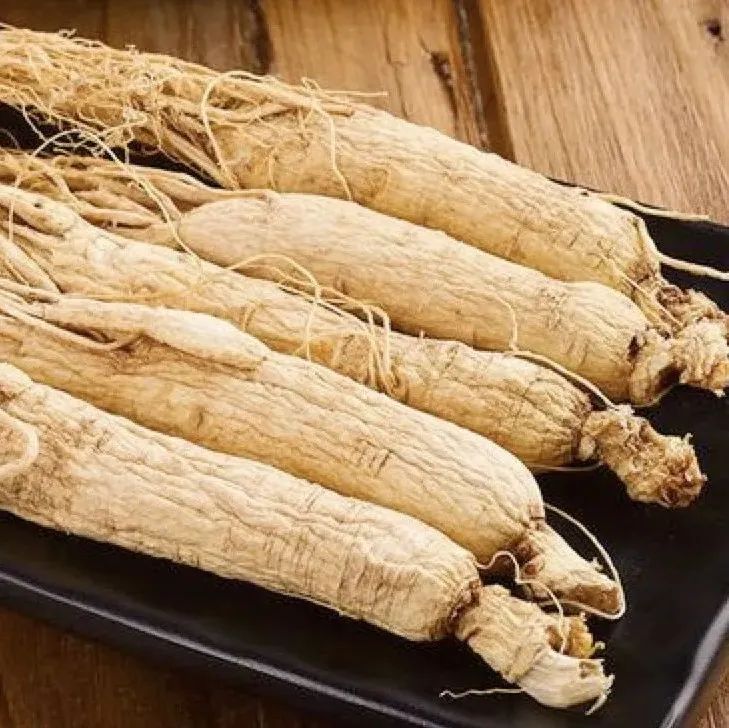
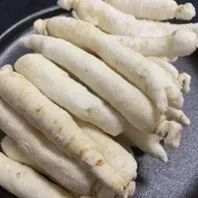 Sugar Ginseng Preparation Method: Use fresh Garden Ginseng as the raw material, wash, fry the ginseng (fry in not fully boiling water for about 20 minutes), puncture the fried ginseng roots, and then soak in syrup (pour boiled syrup into the ginseng container), dry, and dehydrate.Effects: It has the effects of benefiting qi and generating fluids, tonifying the spleen, and moistening the lungs. It is mainly used to treat symptoms such as lung deficiency cough, fluid damage and thirst, spleen deficiency with poor appetite, and internal heat causing thirst. After processing with sugar, the medicinal properties become milder, suitable for individuals with weak constitutions who require long-term conditioning. Sugar Ginseng contains sugar, and diabetic patients should avoid it.Pharmacological Effects
Sugar Ginseng Preparation Method: Use fresh Garden Ginseng as the raw material, wash, fry the ginseng (fry in not fully boiling water for about 20 minutes), puncture the fried ginseng roots, and then soak in syrup (pour boiled syrup into the ginseng container), dry, and dehydrate.Effects: It has the effects of benefiting qi and generating fluids, tonifying the spleen, and moistening the lungs. It is mainly used to treat symptoms such as lung deficiency cough, fluid damage and thirst, spleen deficiency with poor appetite, and internal heat causing thirst. After processing with sugar, the medicinal properties become milder, suitable for individuals with weak constitutions who require long-term conditioning. Sugar Ginseng contains sugar, and diabetic patients should avoid it.Pharmacological Effects
Modern pharmacological studies indicate that the main active substances in ginseng are ginsenosides, with primary pharmacological effects including anti-shock, cardiotonic, anti-fatigue, enhancing learning and memory, improving brain function, boosting immune system, regulating cholesterol metabolism, lowering blood lipids, lowering blood sugar, anti-allergic, anti-ulcer, and antioxidant effects.
Applicable Population
Men and women with various types of deficiency, individuals with insufficient qi and blood, sub-healthy populations, post-illness or post-surgery recovery individuals, those with low immunity, and individuals with neurasthenia.
Applicable Manifestations
General weakness, heavy body, mental fatigue, shortness of breath and reluctance to speak, palpitations, dizziness, pale or sallow complexion, pale lips and nails, insomnia with vivid dreams, women with scanty and pale menstrual flow, cold intolerance, bland taste in the mouth, clear and prolonged urination, reduced urination with edema, and thin stools.
Food and Medicine from the Same Source
At the end of 2023, the National Market Supervision Administration issued a document including ginseng as a raw material for health food, clearly stating the dosage range of 1-3 grams, with effects of relieving physical fatigue and helping to enhance immunity.
Pharmacist’s Reminder:
Although ginseng is regarded as a tonic for health and longevity, it is still a medicine and should not be misused or overused. It is recommended to use it under the guidance of a professional physician. Additionally, tonifying herbs are not the only means to treat deficiency; dietary therapy should also be considered, along with moderate physical exercise.
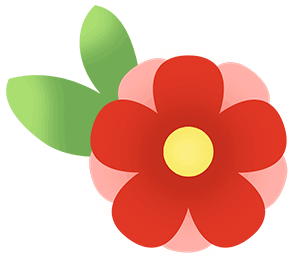 the end
the end

-
Produced by: Pharmacy Department of Shangluo Central Hospital
-
Author: Qu Yijie
-
Editor: Shi Juan
-
Reviewed by: Wang Qinqin
-
(Note: Some images are sourced from the internet, please delete if infringing)

